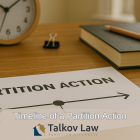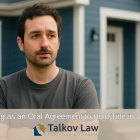Burbank Real Estate Partition Lawyer
Talkov Law’s attorneys serving Los Angeles County are exceptionally experienced in California partition actions and have conducted over 470 for our satisfied clients. A California partition action is a law that allows co-owners of real property to divide the property among themselves. The partition statutes provide a legal mechanism for co-owners to divide the property without having to go through the court system. The partition statutes also provide a way for co-owners to force the sale of the property if they cannot agree on how to divide it. The partition statutes also set out the procedures for the sale of the property and how the proceeds of the sale will be divided among the co-owners. The partition statutes also provide for the payment of costs associated with the sale of the property.
Our team of partition attorneys can assist co-owners with frequently asked questions about partitions, such as:
- How much does a partition action cost? The cost of a partition action can vary widely depending on the complexity of the case. A typical partition action usually costs between $5,000 and $12,000, with about $8,000 being the most common cost. However, difficulty locating a defendant, the motion to appoint a partition referee, delay tactics by defendants, and other issues may raise the cost of your partition action. An experienced partition lawyer can mitigate costs and resolve your co-ownership dispute with maximum efficiency.
- Will the plaintiff win a California partition action? The plaintiff almost always prevails in a partition. This is because the right to partition is absolute under California law. Most partition actions result in the Defendant agreeing to sell the property or buyout the plaintiff’s interest in the property, which is generally the plaintiff’s goal.
- What is the timeline for a California partition action? Most partition actions are resolved in 3 to 6 months by way of settlement. Other cases can take 6 to 12 months to obtain an interlocutory judgment of partition, which generally appoints a referee to sell the property.
- Do I need to go to court to win a partition action? While the partition action must be filed with the court, partition actions rarely involve a trial in which the co-owners appear at court. This means it is extremely unlikely that you will need to step foot in a courtroom. Most partition work is done by motion practice involving tentative rulings with little interaction between the court and the attorneys, let alone the co-owners.
- How will the court in a California partition action determine how much each co-owner will receive from the sales proceeds? Generally, each co-owner will receive their fractional interest in the proceeds of sale based on their ownership interests. However, this amount can be enhanced or diminished by partition offsets whereby one co-owner paid more than their fractional interest for property expenses.
Burbank is a city located in Los Angeles County, California. It is located in the eastern San Fernando Valley, just north of the Hollywood Hills. The city is home to many media and entertainment companies, including Warner Bros. Studios, The Walt Disney Company, Nickelodeon Animation Studios, and Cartoon Network Studios. Burbank is known for its excellent schools, low crime rate, and diverse population. The city is also home to many parks, restaurants, and shopping centers. Burbank is a great place to live, work, and play.
Speak to Our Burbank Partition Attorneys Today
Call our Los Angeles County Partition Attorneys today to end your co-ownership dispute. You don’t pay until the house is sold!
Call us at (818) 900-7700 or contact us below to schedule a free, 15-minute consultation
Gray v. Superior Court – Partition Action Case Study
In the legal case of Gray v. Superior Court, 52 Cal.App.4th 165 (1997), the issue was whether a partition action could be brought against a tenant in common who had not been served with the complaint. The court held that a partition action could not be brought against a tenant in common who had not been served with the complaint, as the tenant in common had a right to be heard in the action. The court reasoned that a partition action is a form of equitable relief, and that the tenant in common had a right to be heard in the action in order to protect their interests. The court also noted that the tenant in common had a right to be heard in the action in order to protect their interests, and that the tenant in common had a right to be heard in the action in order to protect their interests. The court also noted that the tenant in common had a right to be heard in the action in order to protect their interests, and that the tenant in common had a right to be heard in the action in order to protect their interests. The court also noted that the tenant in common had a right to be heard in the action in order to protect their interests, and that the tenant in common had a right to be heard in the action in order to protect their interests. The court also noted that the tenant in common had a right to be heard in the action in order to protect their interests, and that the tenant in common had a right to be heard in the action in order to protect their interests. The court also noted that the tenant in common had a right to be heard in the action in order to protect their interests, and that the tenant in common had a right to be heard in the action in order to protect their interests. The court also noted that the tenant in common had a right to be heard in the action in order to protect their interests, and that the tenant in common had a right to be heard in the action in
Frequently Asked Questions About Partitions in Burbank
How Much Does a Partition Action Cost in Burbank?
The costs of a partition action—including attorney fees, court fees, appraiser fees, and other legal expenses—are typically around $20,000. While some cases may incur fees as low as $5,000 or exceed $20,000, depending on their complexity, these expenses are generally shared among the co-owners. The court may also adjust the distribution of these costs based on each party’s level of involvement or responsibility, ensuring a fairer allocation when needed.
Who Can File a Partition Action in Burbank?
A partition action can be filed by any co-owner of a property, excluding married couples who own it as community property. A majority ownership is not required to initiate a partition action. Common situations for partition actions include disputes among siblings inheriting property, former romantic partners, friends or family members who purchased property together, and divorced couples.
Who Pays for a Partition Action?
In Burbank, each party typically pays for their own attorney’s fees (known as the “American Rule”). However, California partition law allows for an exception to this rule, stating that “the court shall apportion the costs of partition among the parties in proportion to their interests or make such other apportionment as may be equitable.” California Code of Civil Procedure 874.040. Indeed, the court may award “reasonable attorney’s fees incurred or paid by a party for the common benefit.” California Code of Civil Procedure 874.010(a).
Can a Partition Action Be Stopped in Burbank?
Generally, a partition action cannot be stopped, but a defendant may be able to buy time to seek a resolution. Eventually, however, the plaintiff can generally force the sale of the property based on the absolute right to partition.
Contact our Team of Experienced Partition Lawyers Serving the City of Burbank, County of Los Angeles, California
Our Burbank partition litigation attorneys will work diligently to obtain a favorable outcome on your behalf, whether by negotiation or litigation. Talkov Law Partition Attorneys unlocks access to justice for co-owners by funding your case. For qualified cases, you pay no fees until we successfully partition your property by obtaining a sale on the market or to your co-owner! For a free consultation with California’s first and largest team of partition attorneys at Talkov Law, call (818) 900-7700 or contact us online today.
Talkov Law Los Angeles Office
10880 Wilshire Blvd Ste 1101
Los Angeles, CA 90024
Phone: (310) 496-3300
































































































































